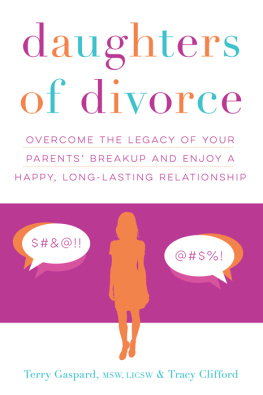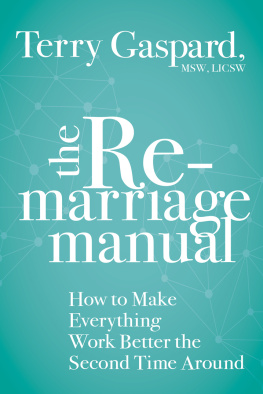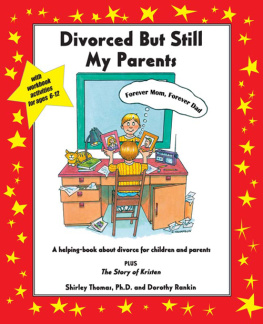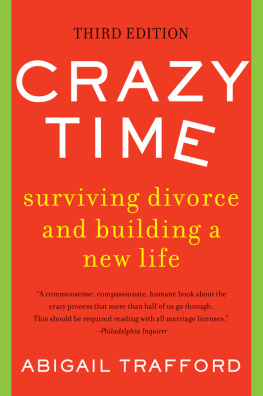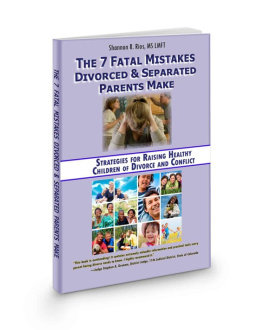Copyright 2016 by Terry Gaspard and Tracy Clifford
Cover and internal design 2016 by Sourcebooks, Inc.
Cover design by Erin Seaward-Hiatt
Cover image Katagaci/RGB Stock
Sourcebooks and the colophon are registered trademarks of Sourcebooks, Inc.
All rights reserved. No part of this book may be reproduced in any form or by any electronic or mechanical means including information storage and retrieval systemsexcept in the case of brief quotations embodied in critical articles or reviewswithout permission in writing from its publisher, Sourcebooks, Inc.
This publication is designed to provide accurate and authoritative information in regard to the subject matter covered. It is sold with the understanding that the publisher is not engaged in rendering legal, accounting, or other professional service. If legal advice or other expert assistance is required, the services of a competent professional person should be sought. From a Declaration of Principles Jointly Adopted by a Committee of the American Bar Association and a Committee of Publishers and Associations
All brand names and product names used in this book are trademarks, registered trademarks, or trade names of their respective holders. Sourcebooks, Inc., is not associated with any product or vendor in this book.
Published by Sourcebooks, Inc.
P.O. Box 4410, Naperville, Illinois 60567-4410
(630) 961-3900
Fax: (630) 961-2168
www.sourcebooks.com
Library of Congress Cataloging-in-Publication Data
Gaspard, Terry.
Daughters of divorce : overcome the legacy of your parents breakup and enjoy a happy, long-lasting relationship / Terry Gaspard, Tracy Clifford.
pages cm
Includes bibliographical references and index.
(trade paper : alk. paper) 1. Adult children of divorced parents. 2. DivorcePsychological aspects. 3. WomenPsychology. 4. Interpersonal relationsPsychological aspects. 5. Man-woman relationshipsPsychological aspects. I. Clifford, Tracy. II. Title.
HQ777.5.G37 2016
306.89dc23
2015009866
To the late Dr. Judith S. Wallerstein, distinguished researcher and author of The Unexpected Legacy of Divorce: The 25-Year Landmark Study and numerous other publications.
Contents
Authors Note
My interest in the lives of women who grew up in divorced families began with my own experience. Not only were my parents divorced, but divorce goes back five generations in my family. My passion for this topic grew along with my personal experiences of divorce: I and two of my sisters experienced divorce, and my clinical practice included many daughters of divorce. After watching my female patients struggle with distinct emotional challenges from their parents divorceand after experiencing it myselfI knew it was time to create a guide that helps daughters of any age overcome the unique legacy of divorce, so they can establish healthy, happy, and long-lasting relationships.
When I decided to write this book, I supplemented my clinical and personal experience by interviewing a large, diverse group of women raised in divorced families. My initial research study included 198 women and was published in 1995. One year later, I examined a larger sample of 325 men and women to explore gender differences. This study was published in 1996. Both of these publications were coauthored with my mentor, Roger Clark, PhD, professor of sociology at Rhode Island College. Over the last five years, my daughter Tracy and I interviewed more than three hundred daughters of divorce between the ages of eighteen and fifty-nine, with the average age of participants being twenty-four. These interviews provided the basis for my recent study of daughters of divorce (20092014).
The women quoted in the following pages were participants in that study, and the stories told here are profiles and composites based on real people. However, names and details have been changed to protect their confidentiality and identities. Details about the location of the interviews were altered in some cases as well for the participants protection. Please note this book isnt meant to replace therapy with a licensed mental health professional. Rather, it is intended to offer an in-depth chronicle of the impact of parental divorce upon women and to provide concrete ways they can improve their relationships. In the end, divorce does not have to define us. We are all capable of creating and enjoying successful partnerships, and this book will help you achieve that.
Terry Gaspard, MSW, LICSW
Preface
FROM ONE DAUGHTER OF DIVORCE TO ANOTHER
(A NOTE FROM TRACY CLIFFORD)
Though we often prize it as the ultimate goal, love is a rare happening among human beings and by far the most intimate experience any of us will ever go through. This is why when love is lost, its also one of the most crushing experiences you can endure, even if you are just witnessing those you love going through a breakup. When a woman is raised by divorced parents, her view of marriage is necessarily shaped by her parents divorce. Witnessing their breakup has the potential to wound deeply, but it can also transform a womans life in ways she couldnt possibly foresee.
For children of divorce, a breakup can set in motion an unending chain of consequences they will continue to experience as adults. As a young woman venturing forth into the world, trying to establish intimate, loving relationships, you may find yourself held back, paralyzed with anxiety or a fear of breaking up. Or you may find yourself committed to partners who are totally wrong for you. You might be in awe of people who stay together, because youre constantly plagued by the fear that people can change their minds at any time. More than anything, you want love. You crave commitment, devotion, and security. But living through divorce taught you never to expect it. In fact, you feel terrified of attaining it and losing it. After all, your parents divorce taught you early on to be skeptical of relationships and leery of love.
Young women who have experienced parental divorce suffer from a unique set of challenges, especially low self-esteem. Its not that these daughters of divorce cant be outwardly successful. Many go to good colleges, enjoy thriving careers, and have plenty of friends. Many appear to have it all. But inside, a nagging feeling persists: I am not good enough.
Like many children of divorce, you may have been told over and over again that your parents breakup was not your fault. But no matter how competently or incompetently their split was handled, for many girls pain is unavoidable. No matter how good you were, you were not good enough to keep your family together. And you probably didnt grow up with a healthy template for how couples achieve intimacy and resolve conflict. And so skepticism of long-lasting love colors your actions, making you mistrust your own judgment or others intentions. Your family, the core support that was supposed to prepare you for going out into the world, has been shattered. If you cant rely on that, then what can you rely on?
As a woman taking your first tentative steps in adulthood, your parents divorce indelibly shapes your feelings about yourself and relationships. Even if your parents divorce is years behind you, you may lack confidence in your ability to create lasting romantic relationships of your own. Fear of loss, fear of reencountering the dreaded fate you endured as a child, stays with you. This is the focus of our work and of this book.

